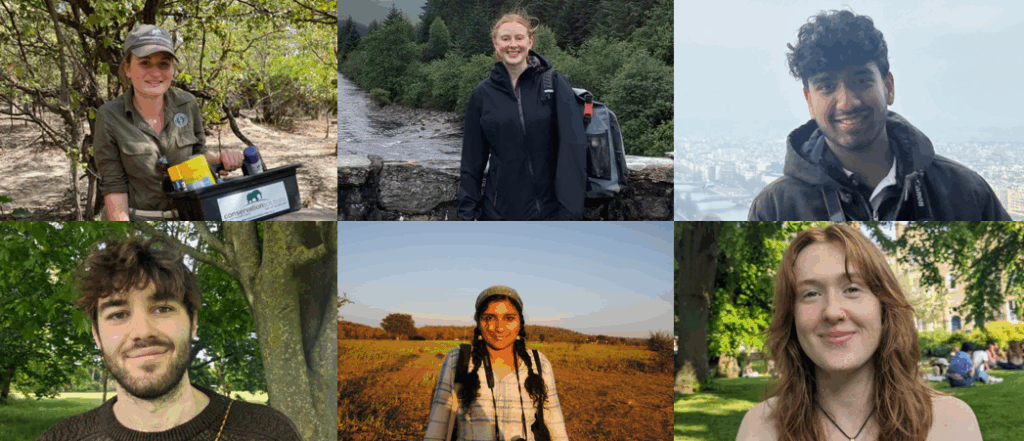Celebrating our 2024 to 2025 Master’s students
October 28, 2025Each year, WildCRU welcomes Master’s students to the group to conduct individual research projects with key members of the team. The 2024 to 2025 cohort included:
Emma Fernhead (MSc)
Emma was fortunate to have grown up in Africa’s conservation sector, travelling to multiple protected areas across the continent, and witnessing conservation performed at scale. Through this exposure, Emma became acutely aware of the roles of governance, management and finance in successful conservation, which are as critical as the science. In pursuit of such skillsets, Emma completed an undergraduate degree in Finance and Accounting, complemented by a postgraduate Honours degree in Marketing and Communication from the University of Stellenbosch, South Africa, completing a final research project which focussed on developing a new mechanism to generate funding for conservation areas that blends philanthropy and immersive tourism. Working under the supervision of Dr. Darragh Hare and Dr. Sue Snyman from the African Leadership University, School of Wildlife Conservation, Emma’s Master’s dissertation investigated conservation practitioners’ perspectives, from various Zambian conservation organisations, on potential financial instruments to respond to human casualties resulting from conflict with wildlife.
Jessica Frater (MSc)
I am a current (as of 2024) MSc Biodiversity, Conservation and Management student at the School of Geography and Environment. Jess completed her undergraduate degree in Psychological and Behavioural Sciences at the University of Cambridge, becoming interested in social and behavioural elements of conservation. Following her BSc, Jess joined the Gibraltar Macaques Project (University of Cambridge) as a behavioural ecology research assistant, conducting fieldwork investigating the behaviour, ecology, and conservation of Gibraltar’s Barbary Macaques. Jess’ MSc research, working with Dr Darragh Hare, investigated associations between message framings, morality, and public perceptions of deer culling.
Shivi Gupta (MBiol)
Shivi studied the effects of misinformation in trophy hunting policymaking and its conservation impacts.
Matthew Hodson (MBiol)
Mattie’s project involved an empirical assessment of wild animal welfare, persuing an interest in conservation sparked by a volunteering trip to Soysambu conservancy (Kenya), where Mattie assisted researchers attempting to conserve the endangered Rothschild Giraffe. During Mattie’s MBiol, he worked studied captive mink, exposing them to otter scent and measuring their stress levels through both physiological and behavioural metrics to inform a wider study by supervisor, Dr Lauren Harrington, about natural variation in stress levels in the wild. Wild animal welfare has for too long been a traditionally understudied area of research, and as anthropogenic impacts propagate and increase in their capacity to impact ecosystems globally, there has never been a more important time to study it.
Sathvika Krishnan (MBiol)
Supervised by Professor Claudio Sillero and Professor Andy Gosler, Sathvika’s MBiol project explored the interface between religion and tiger conservation in India. Understanding and respecting local customs, faiths, and sentiments is crucial in mitigating and potentially resolving human-wildlife conflict. By understanding the religious motivations of the people engaging directly with and impacted by tigers, this project aimed to integrate people’s views into successful conservation efforts of these endangered and charismatic animals. Sathvika’s musical background, as both a South Indian classical vocalist and Western classically trained diploma pianist, inspired her passions for music and ornithology leading to researching the musicality of birdsong . Sathvika was also part of the 2022 Baseline Expedition to the Dracula Reserve, Ecuador, being part of the first team of scientists to ever conduct biodiversity studies in this region of the Tropical Andes.
Kristian Suszczenia (MBiol)
Kristian’s project investigated connectivity science and its application to conservation with supervisors; Egil Droge and Luciano Atzeni, specifically focussing on ways to measure how dispersal corridors are vulnerable to climate change. Kristian trained as a science communicator at the Oxford University Natural History Museum (OUNHM), designing and teaching families about the intersection between space technology and sustainability. He has also used museum archives to track shifting baselines of insect biodiversity in UK wetlands, working on a wetland policy review for governments and organisations in Europe.
Eve Taylor (MBiol)
Eve’s Master’s project explored public perceptions of the potential reintroduction of the Eurasian Lynx to Scotland—a subject of significant debate and diverse viewpoints. The project represented a unique intersection of Eve’s love for the natural world and keen interest in environmental policy and human-wildlife interactions, building on previous expertise developed through projects assessing speciation patterns of endemic plant species across the Canary Islands and the impact of extreme anthropogenic noise pollution on Cetaceans.
